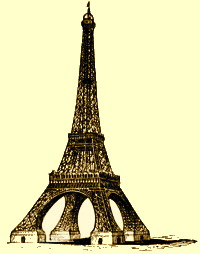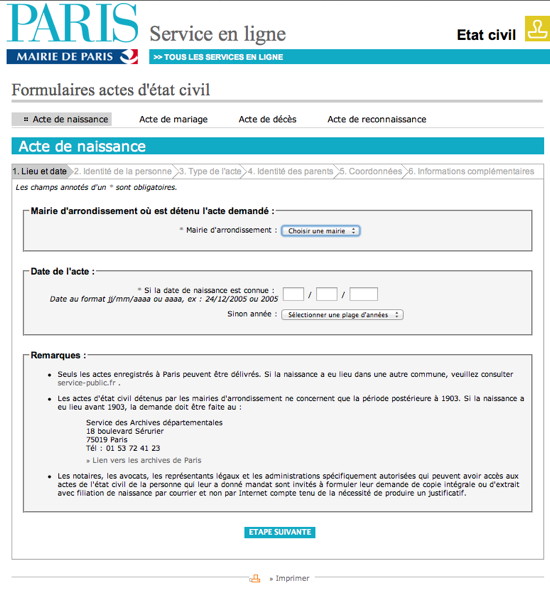You
are receiving this because your address is subscribed at: www.jaunay.com/newsletter.html |
|
 |
| No: 91 |
September 2013
|
|
News September seminars 8: North Adelaide Heritage Walk, WEA Centre Adelaide 2:00 to 4:00pm 15: Semaphore Heritage Walk, WEA Centre Adelaide 2:00 to 4:00pm October seminars 9: Introduction to family history, WEA Centre Adelaide 8:00 to 9:30pm over 7 weeks 25: Researching your English ancestors, WEA Centre Adelaide 6:30 to 9:30pm See the seminar program for more details and bookings. Searching for your French ancestors  Researching family history in France can be quite straight forward and very rewarding as the certificates obtained are very detailed. Marriage certificates in particular are most comprehensive and give full genealogical details of both partners and substantial information on the parents. By following the simple points raised in this article, the reader should find the exercise less daunting. It is relatively easy to do and as skills develop, the rewards will come quickly. At the time of writing, certificates from France are free and at this stage this more than compensates for the postage costs. Unfortunately there are a few barriers to be overcome. Essentially there are three phases in any French research: Researching family history in France can be quite straight forward and very rewarding as the certificates obtained are very detailed. Marriage certificates in particular are most comprehensive and give full genealogical details of both partners and substantial information on the parents. By following the simple points raised in this article, the reader should find the exercise less daunting. It is relatively easy to do and as skills develop, the rewards will come quickly. At the time of writing, certificates from France are free and at this stage this more than compensates for the postage costs. Unfortunately there are a few barriers to be overcome. Essentially there are three phases in any French research: |
In
this issue: |
|
Graham Jaunay Services
|
| Pre-Revolutionary records before 1792 The task of discovering records in France prior to the nineteenth century can be difficult as the archival holdings are immense, incredibly ancient and as likely or not, uncataloged and lacking an index. Archivists usually require the very detail being sought by the inquirer or demand a personal visit. Post Revolutionary records from 1792 It is well documented that the bureaucrats of the immediate post-Revolutionary period established the grounds for one of the finest collections of public records and the recovery of data lodged after 1792 is relatively easy in spite of three periods of enemy occupation. Records less than 100 years old A one hundred year rule restricts access to records to protect privacy. The inquirer has to establish a relationship to the subject being researched. This is not an onerous test and experience reveals that if the enquirer refers to the person as a relative this tends to satisfy the local authority. Known as the law of 3 January 1979 on Archives [la loi sur les Archives du 3 janvier 1979]. All records for the past one hundred years are currently held in the local town hall [Hôtel de Ville] Within local repositories you can expect a greater success rate as often the local people will go out of their way to help an overseas inquirer. The main barriers here include less understanding of English and hence some confusion in what you want. Also sometimes the facility may not have retained the records. There are some statutory limitations on how long local record offices retain records. This is a fairly hit and miss situation as often while they have room the record is retained. Furthermore if the record has a local significance it is often retained. Sometimes the record is deemed too fragile to photocopy. However, you are always welcome to view the document in person! Do consider joining the local Family History Society. Experience with these groups in helping you through sticky patches cannot be underestimated. Join the most appropriate group as any others you need to consult will usually recognise your 'home' society in France. Society presidents have been known to make representations to local archivists on behalf of an overseas member facing response difficulties. Local searchers can usually be engaged through these societies. If you cannot gain a certificate through the above channels, the local researcher will probably be your only alternative. For the local society contact the Fédération Française de Généalogie. Probably the most significant barrier the Australian researcher is going to encounter, apart from the tyranny of distance, is the language. This can be readily overcome by enlisting the help of the Bing translator. Originally online translators were rather clunky but they are improving all the time and the current service provided by Bing is quite sophisticated! Google has an equally effective version too. As a rule of thumb whatever you translate into another unknown language always translate the work back into English. If it still makes sense then the translated piece should be okay too. You may discover that you need to change some words because they are not in the translator vocabulary. For example a former online translator used to have problems translating the sentence, The cat sat on the mat, because the word mat was not in the system and thus the translation came back as The cat sat on the plait. Simply changing mat to carpet in the original fixed the problem.  Local geographical knowledge can also be a barrier to research but Google Maps have largely overcome these issues. While not an essential prerequisite, the reader is well advised to undertake general reading covering the period they are researching in France. Most public libraries have a reasonable collection of general French history books. Look also in the travel section for current information about the district you are interested in. While beyond the scope of this article, it cannot be emphasised too much that for a successful result, a genealogist needs to have a good social, economic and political history background. It is these forces that impact on the daily lives of people and account for many of their actions! Since the basis of all research is to obtain birth, marriage and to a lesser extent death certificates, let us go through the possible avenues to locate a French certificate for the period 1793—1900. To search outside this time-frame is very similar and if you are proficient within this time phase you should have little trouble outside of it. France is divided into administrative areas known as départements [Departments] which correspond to an English county and are administered by a government officer called a préfet responsible to the central government in Paris. Each département maintains an archive in its administrative centre. Googling the département's name will give you their precise address and their website if they have one. Most will not accept emails but will only act on receipt of snail mail. It is as well to point out that some will not even respond to snail mail and require a personal visit to the front counter! Paris accepts online requests just fill in the forms.  If you cannot find the precise address you can use the following standard address: Le Préfecture [Archives] aa000 name of the town FRANCE [note: aa = département number] Thus for Marne [département no. 51 administered from the town of Châlons-en-Champagne previously to 1998 Châlons-sur-Marne] the address is: Le Préfecture [Archives] 51000 Châlons-en-Champagne FRANCE If you are researching in the Paris area you need to know that major boundary changes were made in 1964. The département of Paris was created out of the départements of the Seine and Seine-et-Oise with surrounding départements of Hauts-de-Seine, Seine-Saint-Denis and Val-de-Marne gaining territory. There are three different forms of French birth certificates: • Birth Certificate without the child's parents' names (Extrait d'acte de naissance sans filiation) • Birth Certificate mentioning the parents of the child (Extrait d'acte de naissance avec filiation) • Full and legalized copy of the birth register (Copie intégrale de l'acte de naissance) According to French law, everybody is entitled to order anyone’s birth certificate without the names of the parents. A birth certificate that mentions the parents or a copy of the birth register may be ordered only by the concerned person himself or herself, the ancestors (parents, grandparents etc.), the descendants (children, grandchildren etc.) and the spouse (wife or husband). French birth certificates also inform further events that occurred later on in the life of the concerned person, such as marriage, divorce, separation, acquisition or loss of French nationality and death (these are called mentions marginales). Likewise there are three marriage and death certificates that follow the same pattern: Replace the word naissance with mariage for marriage records and décédé for death records. Write to the archivist in basic English, but preferably French using Bing, and use Australia Post Reply Paid International and expect to receive the response in bureaucratic French. Ensure you request a full copy of any certificates or you will receive a form with only the most basic details. If writing in English write, an exact copy of the — and in brackets to make the point, write the French form as outlined above. Experience shows that your success rate will vary according to the whims of the archivist and the bulk of work they have to undertake. Thus results from Paris are not as successful as those from the less populous regions! One must also remember that the archivist is also bound by certain laws and rules of disclosure and record retention. If the record is less than 100 years old you will be required to prove descent. Due to the size of some collections and the lack of indexing a perusal may not locate the record if it is post 1793 when civil registration was introduced. This does not mean the record does not exist, rather the archivist is too busy to look for it or cannot find it in the myriads of remote storage areas. An unsuccessful approach to the archives does not mean the end of that line of research. Each département is divided into arrondissements [districts] and these are divided into communes [municipalities]. For research within Paris, Lyon or Marseilles, one needs to know about arrondissements as the local records are kept in each Hôtel de Ville [town hall]. For beyond Paris the researcher can get the same level of information from the local Hôtel de Ville [town hall]. You will need to use Google for these addresses as their post codes are far more complex, write to the Mayor (Maire): M. le Maire Hôtel de Ville post code + name of the town FRANCE Thus for Reims the address is: M. le Maire Hôtel de Ville 51096 Reims FRANCE Note: This article was originally produced by Graham Jaunay as an information pamphlet in pre-Internet days and has been updated to reflect current modern practice. |
|
| To
unsubscribe send a blank email via the following link using the same
address you subscribed to: newsletter-leave@jaunay.com |